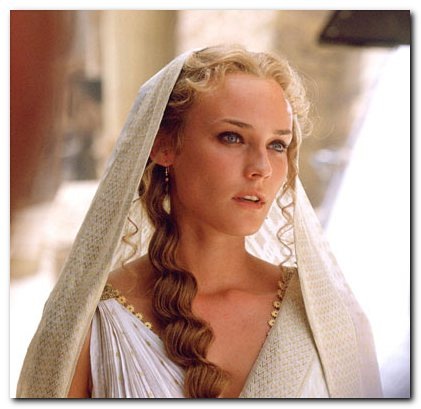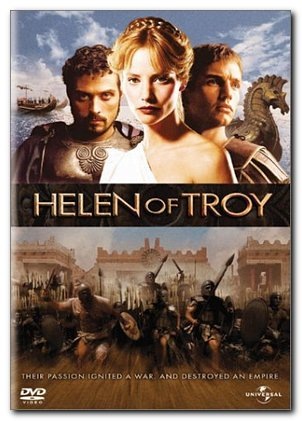 What about the more controversial and weaker aspects of the film?
What about the more controversial and weaker aspects of the film?
Well, the mythological dimension of the legend has been all but exorcised in the film. In the legend, the Greek Gods in part from their rivalry and also that Athena and Hera were (not unexpectedly) angered by Paris not choosing them as the fairest Goddess chose sides in the conflict.
I’m guessing that Petersen removed this dimension out of this narrative as it would have added very large complexities to the story-telling. For instance, you’d have to introduce scenes where the Gods stand around amidst clouds arguing over which hero should die or live. The removal of these elements meant that the story is perhaps grounded more solidly in earthly territory, but it also substantially deviates from one of the original themes.
Several key story points were also changed too. For instance, the film despite its very long running length feels as though the war was fought and resolved in a couple of weeks. In Homer’s poem, most of the interesting events take place in the tenth and final year, but the film in keeping the story moving briskly also removed an important story point: that the Greek army was genuinely tired by the 10th year and just wanted to go home. The novelty of bringing home Helen had fast-faded. In the legend, Agamemnon was facing an increasingly resentful and dissenting army in a war that was seeing no end.
Another change from the legend are the circumstances of Achilles’ death. In the original story, the Greek hero dies in the most unglam fashion: he gets an arrow through his heel shot clandestinely by Paris shortly after he kills then, according to one source, rapes the corpse of Penthesilea, Queen of a group of Amazonian warriors who’d arrived to aid the Trojans. Not very heroic.
The film version puts off Achilles’ death until the climatic sacking of Troy. As the Greek mob pillages, burns and rapes the dying city, we see him racing through the streets looking for his beloved Briseis before being shot in the heel by Paris with Briseis screaming “Noooo!!!!” More heroic I think LOL.
And a couple of the individual characters’ fates have also been significantly changed from the legend. In the legend, Agamemnon survives the campaign only to lose his life upon his return, killed by his grieving wife after she learned that Agamemnon had given up their daughter to the sacrificial altar for his navy to enjoy good winds sailing to Troy 10 years earlier. Menelaus survives the conflict too with Helen at his side, and is one of the few Greek heroes to safely return to Greece. Paris on the other hand is killed before the sacking of Troy, and in the legend could had been saved by this healer wife he spurned in favor of Helen.
In the movie, both Agamemnon and Menelaus both die during the war. And in the most dramatic departure from the legend, it’s Paris who survives with Helen at his side. Ouch. That was just too much.
And lastly, the dialog isn’t the film’s strong point. In fact, it’s cringe-worthy. OK, so we don’t really know how ancient persons talk, but there are plenty of lines that will make you giggle, the more so when you see the actors’ half-heart attempts to speak them in all seriousness.
 Interestingly, Petersen’s film wasn’t the only retelling of the story released at that time. There was a TV mini-series that’d just been completed, titled Helen of Troy (pictured right). It starred the very lovely Sienna Guillory as Helen.
Interestingly, Petersen’s film wasn’t the only retelling of the story released at that time. There was a TV mini-series that’d just been completed, titled Helen of Troy (pictured right). It starred the very lovely Sienna Guillory as Helen.
Despite the very lower budget and cheaper look of the TV series: Guillory can actually act, while Diane Kruger’s Helen in Petersen’s film acts with the emotion range of an oyster and – in my opinion anyway – can’t match Guillory’s physical beauty. I certainly wouldn’t launch a thousand ships for Kruger LOL.
The emphasis in the TV interpretation is also dramatically different from Petersen’s film. Troy the film focuses on Hector and Achilles, but the TV series centers on Helen.
In any case, I may do another post on this TV series later.
***
In a nutshell, how then was this movie? There are actually two versions of Petersen’s film out there. The first is the theatrical version, and the second is the Director’s Cut that I watched in the recent evenings, and which adds about 30 minutes of film time, a reworking of the music soundtrack, and numerous scenes re-edited.
The versions are very different viewing experiences: I thought the theatrical version was pretty bleh – it gets 

![]()
![]()
![]() – but the Director’s Cut is a lot better:
– but the Director’s Cut is a lot better: 



![]() . I don’t think the latter version’s perfect: the removal of the mythical element and most of the key story changes I can live with. But the bad dialog will be a sore point.
. I don’t think the latter version’s perfect: the removal of the mythical element and most of the key story changes I can live with. But the bad dialog will be a sore point.
That said, the film has incredible production values, very well-filmed battle and action scenes, and gets the core of the story right: that this was a tragic war but where its heroes are remembered through time in memoria.
When I can find time, I’ll do another long post on, well, Oliver Stone’s Alexander. Maybe.:)
Recent comments